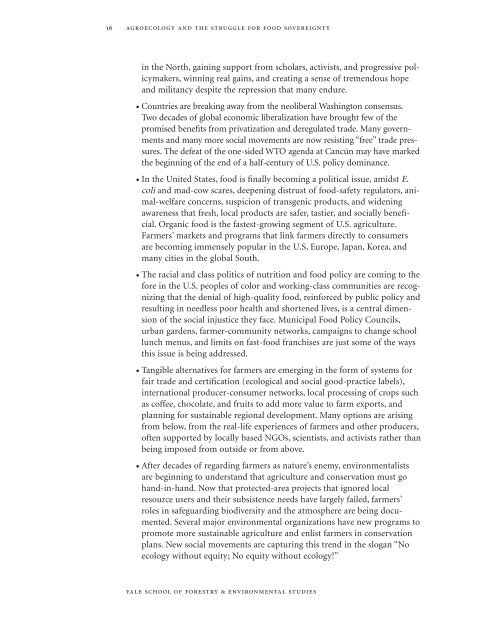Agroecology and the Struggle for Food Sovereignty ... - Yale University
Agroecology and the Struggle for Food Sovereignty ... - Yale University
Agroecology and the Struggle for Food Sovereignty ... - Yale University
You also want an ePaper? Increase the reach of your titles
YUMPU automatically turns print PDFs into web optimized ePapers that Google loves.
16<br />
agroecology <strong>and</strong> <strong>the</strong> struggle <strong>for</strong> food sovereignty<br />
in <strong>the</strong> North, gaining support from scholars, activists, <strong>and</strong> progressive policymakers,<br />
winning real gains, <strong>and</strong> creating a sense of tremendous hope<br />
<strong>and</strong> militancy despite <strong>the</strong> repression that many endure.<br />
● Countries are breaking away from <strong>the</strong> neoliberal Washington consensus.<br />
Two decades of global economic liberalization have brought few of <strong>the</strong><br />
promised benefits from privatization <strong>and</strong> deregulated trade. Many governments<br />
<strong>and</strong> many more social movements are now resisting “free” trade pressures.<br />
The defeat of <strong>the</strong> one-sided WTO agenda at Cancún may have marked<br />
<strong>the</strong> beginning of <strong>the</strong> end of a half-century of U.S. policy dominance.<br />
● In <strong>the</strong> United States, food is finally becoming a political issue, amidst E.<br />
coli <strong>and</strong> mad-cow scares, deepening distrust of food-safety regulators, animal-welfare<br />
concerns, suspicion of transgenic products, <strong>and</strong> widening<br />
awareness that fresh, local products are safer, tastier, <strong>and</strong> socially beneficial.<br />
Organic food is <strong>the</strong> fastest-growing segment of U.S. agriculture.<br />
Farmers’ markets <strong>and</strong> programs that link farmers directly to consumers<br />
are becoming immensely popular in <strong>the</strong> U.S, Europe, Japan, Korea, <strong>and</strong><br />
many cities in <strong>the</strong> global South.<br />
● The racial <strong>and</strong> class politics of nutrition <strong>and</strong> food policy are coming to <strong>the</strong><br />
<strong>for</strong>e in <strong>the</strong> U.S. peoples of color <strong>and</strong> working-class communities are recognizing<br />
that <strong>the</strong> denial of high-quality food, rein<strong>for</strong>ced by public policy <strong>and</strong><br />
resulting in needless poor health <strong>and</strong> shortened lives, is a central dimension<br />
of <strong>the</strong> social injustice <strong>the</strong>y face. Municipal <strong>Food</strong> Policy Councils,<br />
urban gardens, farmer-community networks, campaigns to change school<br />
lunch menus, <strong>and</strong> limits on fast-food franchises are just some of <strong>the</strong> ways<br />
this issue is being addressed.<br />
● Tangible alternatives <strong>for</strong> farmers are emerging in <strong>the</strong> <strong>for</strong>m of systems <strong>for</strong><br />
fair trade <strong>and</strong> certification (ecological <strong>and</strong> social good-practice labels),<br />
international producer-consumer networks, local processing of crops such<br />
as coffee, chocolate, <strong>and</strong> fruits to add more value to farm exports, <strong>and</strong><br />
planning <strong>for</strong> sustainable regional development. Many options are arising<br />
from below, from <strong>the</strong> real-life experiences of farmers <strong>and</strong> o<strong>the</strong>r producers,<br />
often supported by locally based NGOs, scientists, <strong>and</strong> activists ra<strong>the</strong>r than<br />
being imposed from outside or from above.<br />
● After decades of regarding farmers as nature’s enemy, environmentalists<br />
are beginning to underst<strong>and</strong> that agriculture <strong>and</strong> conservation must go<br />
h<strong>and</strong>-in-h<strong>and</strong>. Now that protected-area projects that ignored local<br />
resource users <strong>and</strong> <strong>the</strong>ir subsistence needs have largely failed, farmers’<br />
roles in safeguarding biodiversity <strong>and</strong> <strong>the</strong> atmosphere are being documented.<br />
Several major environmental organizations have new programs to<br />
promote more sustainable agriculture <strong>and</strong> enlist farmers in conservation<br />
plans. New social movements are capturing this trend in <strong>the</strong> slogan “No<br />
ecology without equity; No equity without ecology!”<br />
yale school of <strong>for</strong>estry & environmental studies

















